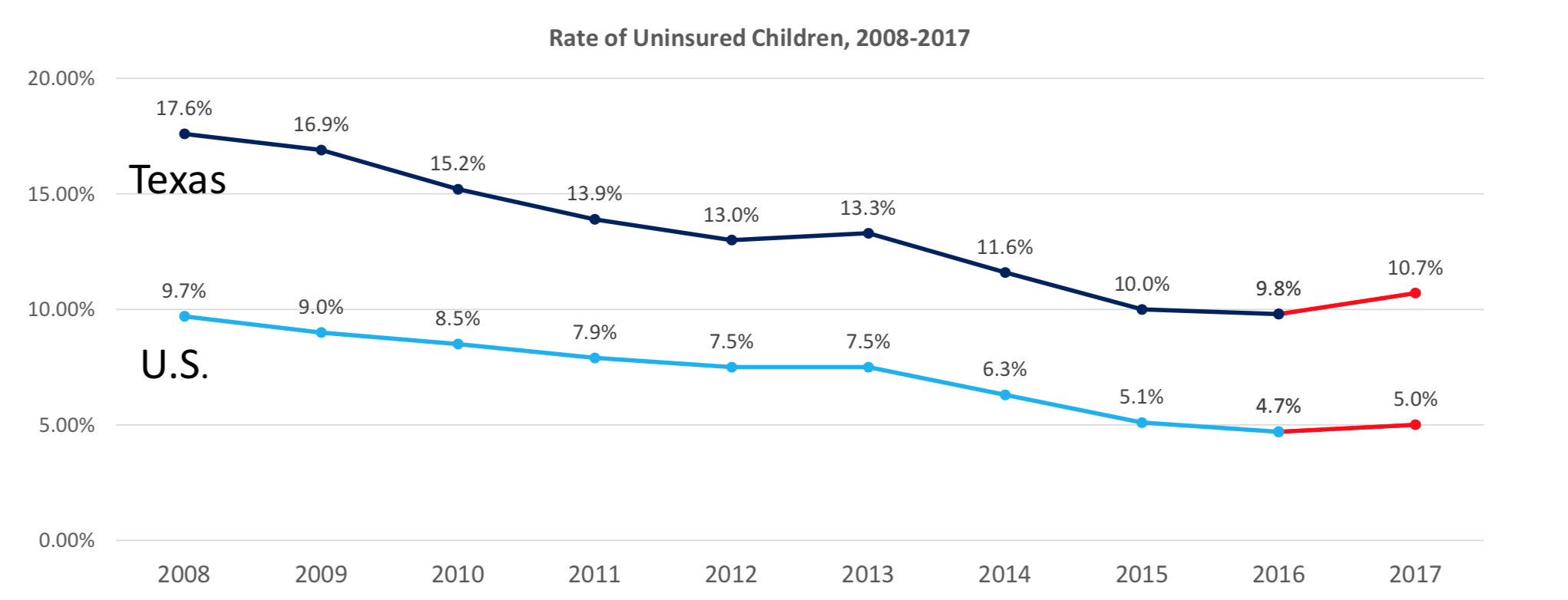Texas has the worst rate uninsured people in the country for the second year in a row, according to information released by the U.S. Census Bureau. Texas was one of only nine states to see an increase in the number of people without health insurance, as the rate increased from 17.3 percent in 2017 to 17.7 percent (around five million people) in 2018. The increase could see increased stress put on the healthcare system in North Texas and statewide, having significant economic impacts.
Texas has nearly twice the rate of uninsured people as the country, with had an 8.9 percent uninsured rate in 2018. Texas is one of the 14 states that has not expanded Medicaid, which would give insurance to 1.5-1.6 million people, having the potential to decrease costly and uncompensated emergency room visits to hospitals all over the state. Expanding Medicaid would send $8-10 billion in federal funds to the state.
The government is paying for the health of these uninsured patients one way or another, but treating patients through primary care clinics is less costly that through hospital emergency rooms, where the uninsured often end up. A paper in the Journal of the American Medical Association study says Texas paid $6.8 billion in uncompensated care in 2016. A report from The Commonwealth Fund says 31 percent of low-income Texas were uninsured, while just 12 percent of low-income residents of Arkansas, Kentucky, and Louisiana were uninsured. The report goes on to say that 42 percent of those without Medicaid said it would improve their financial situation, helping them avoid medical debt and aiding their ability to provide an economic impact to the state. In addition, the report said that 78 percent of respondents said receiving Medicaid would not effect their desire to work, and 19 percent said it would increase their desire to work.
Most respondents in the Commonwealth survey said Medicaid expansion would improve the Texas economy. Expansion would help rural hospitals avoid closing, as 19 have done in Texas since 2013, and which are major employers in rural communities. There would also be savings from state budgets.
There are several factors that could be influencing the downward trend in Texas and nationwide, says Steve Love, President of the DFW Hospital Council. Shortening the enrollment period and large cuts in the marketing budget for the healthcare exchanges on the individual marketplace are certainly factors, he says. Since 2016, the federal government has cut funding for healthcare navigators by 84 percent.
Another factor, says Love, could be the recently posted Department of Homeland Security Public Charge Role, which takes effect October 15 of this year. The rule says that those applying for citizenship may be denied if they are likely to become a public charge, meaning they are dependent of government programs for support. While the rule only impacts those who are applying for citizenship, it is having a chilling effect on Medicaid applications and Children’s Health Insurance Program applications.

In 2017, for the first time since the implementation of the Affordable Care Act, Texas saw the number of children who don’t have insurance increase from 9.8 percent to 10.5 percent, according to the Center for Public Policy Priorities. Around 4,200 kids each month are losing health coverage for procedural reasons such as paperwork not being turned in. A recent study from U.C. San Diego said that one in five low income immigrant families were worried that accessing public benefits like Medicaid would impact their ability to follow lawful immigration processes.
The decrease in Medicaid enrollees could in theory be a good thing, as it could be a result of Texans whose jobs are now providing health insurance. The record-low unemployment in Texas and nationwide could be the cause, but the increase in total number of uninsured people statewide means that increase financial situation is probably not what has reduced Medicaid numbers.
Another major factor are the working poor, says Love. These are people who make too much for Medicaid as it currently exists, but don’t have insurance through their employer and don’t make enough to qualify for health insurance exchange subsidies. According to the Kaiser Family Foundation, a family that makes money just above the poverty line can qualify for marketplace subsidies and pay just $43 dollars for health insurance for the adults, while making just below the poverty line would mean the children could get Medicaid but the adults would have to pay $577 for health insurance on the marketplace. Families like this have to make tough decisions about where to spend their money. “Many times what gets cut is healthcare coverage,” Love says.
For hospitals, the lack of insurance means an increase in the frequency and cost of uncompensated care. “Hospitals treat patients regardless of their ability to pay,” says Love. If more patients are uninsured and have’t been receiving medical care, it can erode margins for hospitals. “If uninsured people don’t have a primary care provider, they come to ER in a condition much worse and more acute. Providers could have intervened early in the process.”
It can crowd the emergency rooms where patients often go when they don’t have primary care physicians, affecting staffing as well.
Without Medicaid expansion and with fewer enrollees in the program, hospitals are asked to treat sicker patients with fewer resources. “It’s a trend that we don’t like to see,” says Love. “We need to sit down with legislators, insurance companies, providers, patients, and need to come up with solutions.”
Even at public hospitals, everyone ends up paying for increased healthcare costs. Dallas County is paying $700 million in property taxes for low income or uninsured residents seeking care at Parkland Memorial Hospital, says Mike Malaise, Senior Vice President, Communications and External Relations at Parkland.
Most of the patients the hospital sees work but don’t have health insurance, he says. Medicaid expansion would help cover the hospitals expense on these patients up to 90 cents on the dollar of care. A hospital like Parkland attracts uninsured patients from surrounding counties without public health options, adding pressure to Dallas County taxpayers.
Because of Texas’ low rate of health insurance, people in surrounding counties, desperate to find care, no public system in their county, come to parkland, Dallas county taxpayers, even though folks don’t live in the county
Between 2016 to 2018, about 20,000 fewer people enrolled in Medicaid in Dallas County, Malaise says. He says there are 400,000 people in Dallas County who are eligible for Medicaid and 600,000 uninsured, leading Parkland to aggressively enroll patients in Medicaid if they are eligible.
Parkland does have a charity program that can help those without health insurance up to 250 percent of poverty. Right now, 76,000 people are enrolled in the Parkland Financial Assistance.
Those without insurance keep constant pressure on public health entities like Parkland full at all times, pushing places them to look for solutions that increase efficiency and lower cost. They have looked at ways to use technology to reduce face to face visits and keep hospital beds clear, and have other programs that work with mental health providers and law enforcement to reduce hospital visits.
They haven’t given up, and are working to expand Medicaid with Texas legislators. Parkland can’t technically lobby, but “We can educate legislators about the impacts of policies, tell them what advantages there are to be gained from Medicaid expansion, give them what the impact would be,” Malaise says.



